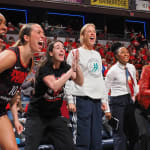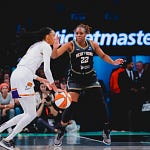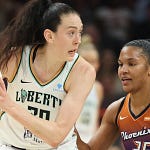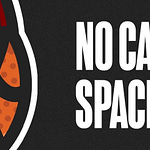Man, has this WNBA postseason delivered. Every game night it feels like we get some new piece of drama, some legacy performances and matchups that go down to the wire. Much like the bars Stefon would recommend on Saturday Night Live, these playoffs have everything. Maybe even Dan Cortese. Who’s to say?
Our Playoffathon coverage continues over on YouTube where you can subscribe to our channel. We are live every night after each playoff game and will be doubling down as we head into the WNBA Finals at the end of this week. Who will meet the Phoenix Mercury there? That will be decided on Tuesday when the Indiana Fever and Las Vegas Aces play a win-or-go-home game in Michelob Ultra Arena. It doesn’t get any better than this and, to add on to the craziness that has been the WNBA postseason, the NCAA women’s basketball season starts in just over a month as well.
So if you’re considering signing up for our paid subscription tier, which gives you access to our Discord chat, exclusive content and Boots on the Ground features, you won’t be losing a thing when the W is done. We just move right into the next season because the basketball never stops.
Now, onto the column!
1. The Mercury Deserve Their Flowers As An Organization
To quote the venerable Dril, ‘under no circumstances do you gotta hand to them’. But in this case you do, in fact, have to hand it to Mat Ishbia.
What’s fascinating is that you can be from Phoenix and have two totally different opinions of the debutante owner depending on which basketball team you follow more closely. In a lot of ways, Ishbia feels somewhat reminiscent of James Dolan and his ownership of the New York Knicks and New York Rangers. As a fan, it’s felt that whichever of the two teams Dolan is more hands-off with is the team that ends up being more successful. While Ishbia has spent much of his tenure with the Suns appearing to meddle in the day-to-day affairs of the NBA franchise, he’s kept a relatively low profile in the W, writing the checks and allowing the Mercury to run smoothly.
That’s resulted in a state-of-the-art team facility that was able to play a role in attracting free agents like Satou Sabally and Alyssa Thomas. It’s also given General Manager Nick U’Ren, the Ball-Knower’s Executive of the Year, the latitude to build out the team as he sees fit. Trading for Thomas and Sabally was a masterstroke but, perhaps more importantly, it all came together in year one. It’s exceedingly rare in this league where free-agent or trade-driven superstar cores gel like this immediately. New York made it to the WNBA Finals in their first season with Breanna Stewart, Sabrina Ionescu and Jonquel Jones but it took until 2024 for them to look the part of a champion. Seattle’s microwaved championship core never made it to the Finals before Noelle Quinn was let go as head coach. Shoot, even L.A., Dallas and Chicago, who tried to load up with veterans to hunt for a playoff spot, ended up not living up to their billing.
Yet somehow in Phoenix, where the offense runs through Alyssa Thomas in a way relatively unique in the W’s history, they are four wins away from a title. There may be a lot of flaws in Mat Ishbia as an owner. His organization has dealt with a few different lawsuits and now is on the receiving end of a slew of not-so-rosy stories about allegedly forcing employees to sign paperwork effectively waiving their right to sue for anything. The Suns look like a bit of a clown show and had to deal away Kevin Durant after a nothingburger of a tenure. And yet, things look about as good as they can on the women’s side of things. They flipped over their roster completely with a coach who has proven to be one of the better in-game tacticians in the league while also making the needed investments to compete.
If you choose to look at this with a glass half full mindset, it is a great precedent and signal to the next set of expansion teams coming into the league. Basically, if you invest appropriately, you too can be a Golden State, a Phoenix, Las Vegas or New York. The teams that are putting their money where their mouths are happen to be the ones succeeding. For a league and a sport that has been saying that investment will lead to success for over two decades, it’s nice to see that axiom be proven true time and time again.
2. Alyssa Thomas Is Having Her Legacy Postseason
I know that Alyssa Thomas and her play style aren’t for everyone. It’s important to note that that indeed is okay. To me, the more play styles you have in a sports league, the more interesting things can be from a schematic perspective. College football fans may hate to see a triple option or flexbone team but I sure love to see coaches try to figure it out. In the same vein, there just aren’t a lot of WNBA teams running inverted pick-and-roll with a physically gifted power forward who is a regular triple-double threat. It’s fair for some people to not enjoy the shoulder checks or the bull rushes down the floor. But I feel that it adds something to the game and forces great players and coaches to do something different. It can get to a point where it’s not so fun and that’s something that falls at the feet of officials (more on that in a moment).
I write that long preamble to say that we can’t discount Alyssa Thomas when all is said and done. Would it be fun if she had a more consistent jumper? Sure. But what the 33 year old Mercury superstar is doing this postseason is everything most of her detractors have been asking for for years. In this last semifinals series, Thomas averaged 20.5 points, 8.25 rebounds, 9.5 assists and 2.5 steals per game on 51% shooting from the field. For starters, those are MVP caliber counting stats. But beyond that, it shows a new willingness to shoulder the scoring load for her team. In past years, we’ve gotten 20+ point bursts out of AT but most playoff matchups had her finishing with anywhere between 13 and 18 points. This time around, Thomas is more than willing to go to the basket, try to get calls and feel comfortable taking it herself in crunch time. Usually when we’re assessing players at the MVP caliber level or higher, we like to see that extra gear in the playoffs. Something of a takeover gene, if you will.
This season, Thomas has given us that effort and what we’ve been treated to is a totally different player than who we typically see in the playoffs. Don’t believe me? I quite literally compared AT to Rudy Gobert earlier this year, remarking that they’re similar in that they can own a regular season but have clearly exploitable deficiencies come the playoffs. These last two weeks, the Mercury’s star forward has shut me up good.
If Phoenix manages to go the distance, it completely changes how we talk about Thomas and her impact in the WNBA. On some level, it’s reductive to distill legacy down into whether or not you win rings, but I do think part of winning championships as a superstar level player involves you having to find that gear of greatness. So far, AT has given us that gear and even a bit more. Regardless of how the Finals go, I do hope that Thomas finishes the season with a few more fans on her bandwagon. Count me among them. It’s been a phenomenal playoff run and deserves its flowers even while it’s happening.
3. A Gamecock Rivalry And Building The Hate Ethically
Here at No Cap Space, we often joke about this concept of ethical and unethical hate. As Chauny describes it, “Ethical hate is letting people know up front where you stand so if they choose to engage that’s on them. Basically a heads up that this argument isn’t being made in the the best faith so proceed with caution.”
In essence, knowing where the lines are between playful banter and personal attacks. If you’re someone who thinks they have a good concept of where that line is (which is the vast majority of fans, to be clear), then this postseason was tailor made for you. For the most part, a lot of the banter between teams has been relatively low impact in terms of depth. Napheesa Collier’s injury does cast a pall over some of this but generally, the beef all feels pretty self contained to basketball. Within that, I think we can all afford to let things be fun for a second. Take A’ja Wilson and Aliyah Boston, for instance. I love the fact that the four-time-and-reigning back-to-back MVP is airing out a former Gamecock heir apparent about a perceived special whistle. It’s great to see an up and coming superstar not scared at all of incurring the wrath of one of the faces of the game. These are good things that foster good discourse around the game. There is always a conversation to be had around some of the more specific ways sports and culture intersect and how they power public opinion. We should welcome those takes and critical views of the things we enjoy.
At the same time, however, we should be allowed to indulge in the sheer competition of it all. There are legacies on the line here and it feels like both Wilson and Boston know that. There is the connective tissue of South Carolina and Dawn Staley. There’s Wilson’s own hero’s journey that is woefully underdiscussed even though it underscores how remarkable her ascent has actually been. And then there’s Boston who, since a cruel-at-best-coded-at-worst framing as soft and a crier, has stepped into her power and embraced the title of tough player to go against. Everything that we like in sports is here. The drama, the backstory, the human emotions that power superhuman athletic performances culminating in an ending that is truly unknown to us until the moment it happens. This is the exact type of thing the WNBA has been asking for and it’s been delivered organically. Is it the size of the other rivalries the league office seems to prize? Maybe not. But it’s certainly a healthy foundation with which to build upon.
Whether it’s been Indiana vs. Las Vegas, Minnesota vs. Phoenix or any of the first round games, we’ve been given competitive matchups, elite trash-talk pre, during and post game and the most smoke anyone has had is for the officiating. It’s exactly what people have been asking for and I hope we appreciate it for what it is. Rivalries and legacies are being built here and everyone involved with the games seems to know it. Maybe larger scale media doesn’t but that’s okay. The Ball-Knowers know. And that’s enough for me.
4. The Possible Revolution (And Unintended Consequences) in WNBA Coach Hiring
Happy Trails, Noelle Quinn and Sandy Brondello.
The Seattle Storm, after a first round exit against Las Vegas, parted ways with Quinn while the Liberty did the same with Brondello after New York’s game three loss to Phoenix. The two don’t have a ton in common, when you line up their backgrounds and circumstances. But they are alike in that they’re both WNBA lifers who have been let go amid what seems to be an ever-shortening leash for coaches in the league. Let me be clear, I think it was time for Noelle Quinn to go. Whatever critiques one may have for Storm general manager Talisa Rhea and how this roster was constructed, it had the top end talent to be a WNBA Finals contender. When you line up the starting fives on paper, the Storm should’ve matched up well against anyone. Quinn’s rigidity in not utilizing her bench while also dealing with consistent allegations of fostering a negative locker room culture, it just didn’t feel like Seattle had a lot of good to point to heading into a pivotal offseason. Now, you at least can do a proper search, hire the right coach and be able to promise a vision when free agency comes around.
As for Sandy Brondello, it is quite a statement to fire your coach one season removed from a WNBA championship and then say in a press conference that she was on the block that season too. However people try to massage General Manager Jonathan Kolb’s statements, it was a revealing look at what the calculus actually was in parting ways. I can’t imagine Breanna Stewart is too pleased.
I’m intrigued about the possible clash of visions when it comes to Sabrina Ionescu. One of Kolb’s exit interview quotes concerned the pairing of his former No. 1 pick and Natasha Cloud. While he was careful to not say Ionescu’s dip in numbers were an indictment on Cloud, he did cite problems with Sabrina’s off-ball involvement. If Brondello felt that Ionescu wasn’t a true point guard but Kolb felt the opposite, how much does that clash of visions lead to a somewhat surprising parting of the ways? In any case, a WNBA expansion franchise is going to get a proven coach that can probably establish a high floor early.
While understandable (on some level) decisions, there is an interesting trend popping up in the W these last few years. Beyond the clear and sharp drop of black women coaches in the league — a necessary thing to point when a supermajority of the league are black women — there has also been a shift towards more modern coaching systems. The Atlanta Dream and L.A. Sparks found analytically driven motion-offense coaches in Karl Smesko and Lynne Roberts. The possible New York Liberty targets all have some type of NBA bonafides to them. If the trend continues and the so-called ‘old guard’ of WNBA coaches is phased out entirely, what does that mean for the coaching pipeline?
There’s an argument to be had here that new systems will, over time, permeate through coaching trees and make the technical side of the game better at every level. New York could hire a coach from the NBA like Lakers assistant Lindsay Harding and her system will filter to her assistants and whatever jobs they may take and assistants they may have. It’s one of the few places where trickle-down does tend to work. That move into the future of the game won’t come without consequence, however. If you allow the perception that longtime WNBA coaches don’t have the juice to contend with a new schematic revolution in the league, it will become shared reality eventually. Not only does that hurt people like Brondello but it hurts the next generation of coaches like Briann January or LaToya Sanders. They would also have to fight that perception.
Change is good but, like many things, it has to be done with respect to what is being changed. The revolution is here in the WNBA but it doesn’t mean everything (and everyone) has to be wiped away in the process. It may not be a concerted push or mandate to do so but even unconscious biases can eventually mutate into calcified worldviews. Food for thought as we discuss merits and risks during this coaching carousel.
5. Can You Actually Fix the Officiating Problem?
Before I start, I want to lay out what I think balance is in officiating. Effectively, I think of a well-officiated game is one where I don’t see officials disrupt the flow on the floor. If they are calling things the same from the opening tip until the final buzzer, then they’ve done a good job. If they’re letting things go and managing to keep control of competitors emotions, they’ve done a great job.
As it currently stands, there isn’t anything the WNBA can immediately do to fix the officiating problem. The National Basketball Referees Association (NBRA) handles the NBA, WNBA and G-League and has their own collective bargaining agreement with the league. But once again, we’re looking at a potentially hamstringing problem for the W that originates from the league’s relationship to the NBA. Simple economics would dictate that you want the best officials to be assigned to the league that makes the most money. As Annie Costabile of Front Office Sports noted in an excellent piece on the subject yesterday, some within the WNBA don’t like that their refs can be promoted to the NBA but it’s exceedingly rare to see a men’s official come over to the women’s game.
Real change would require WNBA officials splintering off to create their own union, which would then require the W as a business entity to formally recognize and negotiate with that union. Would the league, that is owned mostly by the NBA (and NBA affiliated owners), really do that to the NBRA? I highly doubt it. Unless there is legitimate change, it’s likely that the W will remain something of a farm league for officials to ply their trade in before they get called up to the NBA when they show any type of promise. There are upgrades that can be made to training standards, pay and potentially pipelines for which to identify and cultivate talent. But once again, those types of requests have to come from the NBRA, which logically would be more interested in getting concessions when the men’s league is ready to bargain than expend the political capital on women’ hoops.
A steady undercurrent for the last two years has been the growth of the WNBA and how its ties to the NBA have created potential roadblocks towards the most opportunity. You’d have to think that eventually the rubber would meet the road (on officiating specifically) and things will change but all one has to do is look at Major League Soccer to know that closed systems in today’s world are likely to remain closed. So the WNBA is going to have to figure it out within the parameters the NBA is likely to set. For their sake, I hope they’re able to hit their mark. The game depends on it.












